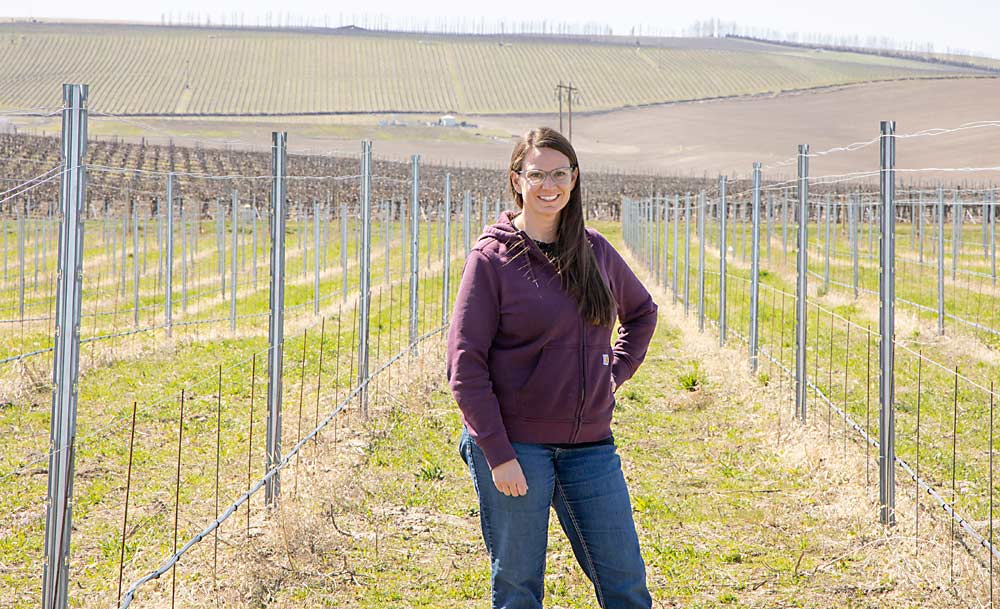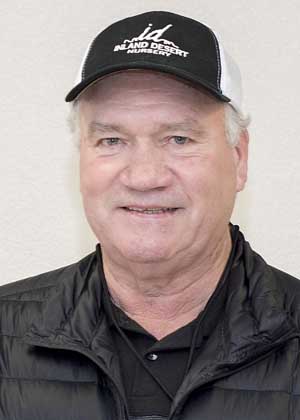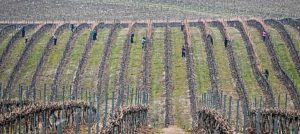
Walla Walla wine grape grower Sadie Drury was surprised at work in the vineyard one day in March when her bosses presented her with the Washington Winegrowers Association’s Erick Hanson Memorial Winegrape Grower of the Year Award.
It was an unconventional presentation — with no conference banquet due to the pandemic — for an unconventional honoree: At 38, Drury is the youngest grower of the year and the third female winner in the award’s history. But 2020 was a fitting year to honor Drury, whose flexible and safety-first approach to farming through a pandemic resulted in a profitable season in a difficult year.
“We learned from our COVID year to be flexible, and we’re going to be a better company because of it,” said Drury, general manager of North Slope Management, a vineyard operations company based in Walla Walla. She farms about 280 acres in SeVein Vineyards for some of Washington’s premiere wineries, including L’Ecole 41, Pepper Bridge and Leonetti Cellar, whose owners are the managing partners behind SeVein Vineyards and North Slope and who hired Drury in 2013.
“She came on board as a viticulturist, but the more we saw her, the more impressed we were,” said Norm McKibben, founder of Pepper Bridge Vineyard and Winery. He credits Drury’s success to her work ethic, organization and ability to hire the best people.
“She now has a waiting list of people wanting to come and work, while others in the area are struggling to find workers,” he said. “Her other forte is that she’s hired very good support people, because one person doesn’t handle it alone.”
L’Ecole 41 winemaker and co-owner Marty Clubb praised Drury’s relationships with her employees and her customers — some 50 wineries the vineyard serves every year.
“She’s built an unbelievable team,” Clubb said. “It’s the way she treats people. In this industry, you can see some old-school methods of managing, but she’s using new-school methods and it’s working.”
As for the customers, in a normal year it’s a lot to juggle the demands of dozens of winemakers, Clubb said. In 2020, some wineries pulled back in the face of uncertainty, himself included. “She lost a lot of fruit sales, but she found replacements when we were in a glut of grapes,” he said. “It speaks to the reputation she has built up as a quality viticulturist.”
Success in a pandemic
Earlier this year, Drury spoke about her strategies for successful wine grape growing during a pandemic at the Unified Wine and Grape Symposium, which was held virtually this year. Drury was joined on the panel by Tony Bugica, director of farming and business development for California’s Atlas Vineyard Management, and Craig Ledbetter of Vino Farms in Lodi, California.
“What made us successful in 2020 was flexibility, changing management practices and communication,” Drury said. Tragically, a foreman with 20 years of experience died from COVID last May, a loss that forced Drury to think about developing a game plan to make sure there is enough cross-training on her team to ensure operations could continue smoothly if anyone else — including herself — had to take extended time off for illness or family care.
While both Bugica and Ledbetter farm far more acres and manage many more employees, they echoed Drury’s sentiments that strong communication and flexibility helped them get through the year.
“Farmers, we’re good at this, we juggle balls every day. Some of us really excel with some pressure on us,” said Bugica, who manages 4,000 acres of vineyards in Napa, Sonoma and Mendocino counties. “Because we are fire veterans, we are pretty quick” with emergency response.
The focus on safety went beyond PPE, he said. During the hot harvest weather, they told employees to slow down, to reduce the strain of working masked, but still paid them the same rates they would have received at full speed.
Looking ahead to the 2021 season, and beyond, some of the pandemic-driven adaptations are likely here to stay, the panelists said. For example, meeting via video chat, especially during the chaos of harvest or with managers dispersed across multiple ranches, said Ledbetter, who manages the operations for 5,300 acres of vineyards out of the company’s 16,000. In total, Vino Farms employs about 425 people full time, along with another 1,000 seasonal workers hired through farm labor contractors.
“Dealing with positive cases was something we knew we would have to do,” with a workforce that size, he said. “Our HR director was an absolute rock star” and took on the responsibility of contact tracing for employees and their families.
Communication with wineries was critical to figure out where production costs could be trimmed and where growers needed to pivot, Bugica said.
“Farming on speculation is not profitable,” Drury said, so in areas where her usual customers wanted to cut back, she changed up her management to keep labor to a minimum on initially unsold grapes. “In some blocks, we didn’t shoot thin, we just pruned heavy to reduce the buds and still created a good product to sell at a discounted price,” she said.
As a result, the vineyards sold all the fruit and remained profitable in a difficult year.
This year, demand is back, and all her fruit was sold before bud break, Drury said, but she is keeping some of the relationships with those new buyers as a cushion while the market instability shakes out.
The biggest lesson of the pandemic centered on relationships, she said, especially how much kindness and compassion matter in managing people.
“When an employee comes to work and says, ‘I’m really afraid,’ we said, ‘Just come back when you are ready.’ It helped to build a bigger and stronger crew,” she said. She also offered flexibility to workers who needed to juggle child care — about half her 48 employees are women — and work schedules.
In fact, as farmworkers in the region spread the word that the company took COVID seriously and offered flexible scheduling, applications came pouring in.
“For the first time ever, we had enough employees,” Drury said. “We can create a situation where our employees want to be here just by being better humans.”
Moving into 2021, she plans to keep the larger crew and keep offering that flexibility.
“My goal this year is to learn to farm in 40 hours a week,” she said in a later interview. Lawmakers in Oregon, where SeVein is located, and Washington were debating bills to rescind the states’ overtime exemption for agriculture as this issue went to press. That means recognizing that her employees may also need another job.
“If they want to work 30 hours for me and 30 hours for somebody else, that’s fine with me. Carla (the women’s crew lead) and I are super flexible as long as people communicate,” she said. “Yes, it’s complicated, but I think that’s why we haven’t had trouble finding good employees.” •
—by Kate Prengaman
Winegrowers awards


The Washington Winegrowers Association also honored two other industry leaders as part of the virtual conference in March. The Grand Vin Award, which recognizes significant contributions to the wine industry, was presented to Brian Carter of Brian Carter Cellars. The industry service award was presented to Tom Judkins, the founder of Inland Desert Nursery.







Leave A Comment